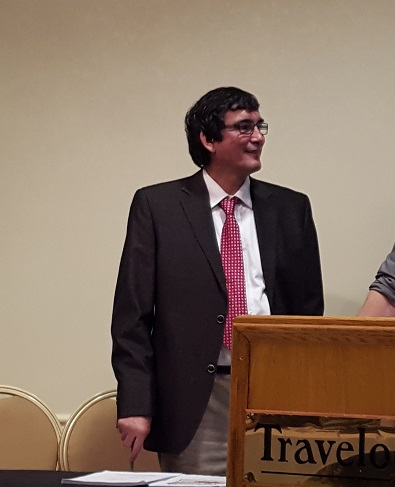Duane Favel pictured on Nov. 17 at a meeting in Prince Albert. Photo by Chelsea Laskowski
The new Aboriginal chair of the Saskatchewan School Board Association says he ran for the position because he wants First Nations and Metis people to have a voice in the ‘transformational change’ the province is touting with an education review that’s currently underway.
Ile-a-la-Crosse Mayor Duane Favel was elected to the association’s executive last week, and said he knows it’s a pivotal time for K-12 education across the province. Saskatchewan has hired an experienced policy analyst, Dan Perrins, to spend the next month preparing reports on both school funding and on education governance.
Up until last week Favel was also an executive member of New North, but at its annual mayor and council meeting he decided not to run again.
At that meeting, there were rumblings of discontent about the province floating the idea of amalgamating the province’s 28 school divisions.
The north is served by three school divisions: Northern Lights, Creighton, and Ile-a-la-Crosse. This is unique, since Creighton and Ile-a-la-Crosse are two of only three community-based divisions in the province.
During an open question period at New North’s gathering, Ile-a-la-Crosse Councillor Gerald Roy spoke in favour of his community’s model.
“We work very, very well together in collaboration in coming up with solutions to a lot of our problems in our community. Why dismantle that, is beyond me. I think the province has to know there’s success stories out there and we need to let them know that loud and clear,” he said.
Favel said the government hasn’t explained what its proposed “transformational change is all about,” and that lack of clarity is leaving more questions than answers.
“People are just speculating right now,” he said.
That’s why Favel wants to make sure Perrins knows what matters to northerners when he’s preparing his report.
“I think school divisions now have an opportunity to get in touch with Dan Perrins and ask him some pointed questions in terms of what this might mean and suggest options that might be included. So I think there is still a small window of opportunity to influence the process,” he said.
Additionally, the SSBA launched a campaign on Tuesday for the public to let the province know about “the importance of local and community voice in education.”
In coming months, SSBA executives will be part of an education panel that gets a first look at the education report’s findings. To Favel’s understanding, the provincial cabinet will make a decision based on that report and create a committee that will travel the province asking for suggestions on how that option will be implemented.
Favel said as an SSBA executive member he will also focus on holding the premier and cabinet to account on the Saskatchewan Plan for Growth. The plan includes doubling Metis and First Nations graduation rates and improving Metis and First Nations education achievement.
“So far, although it’s in their Saskatchewan Plan for Growth there haven’t been a lot of resources, I think, directed to making that happen. So we just have to keep reminding them and make them accountable that they have these targets and objectives and what are they doing to work towards them,” he said.
